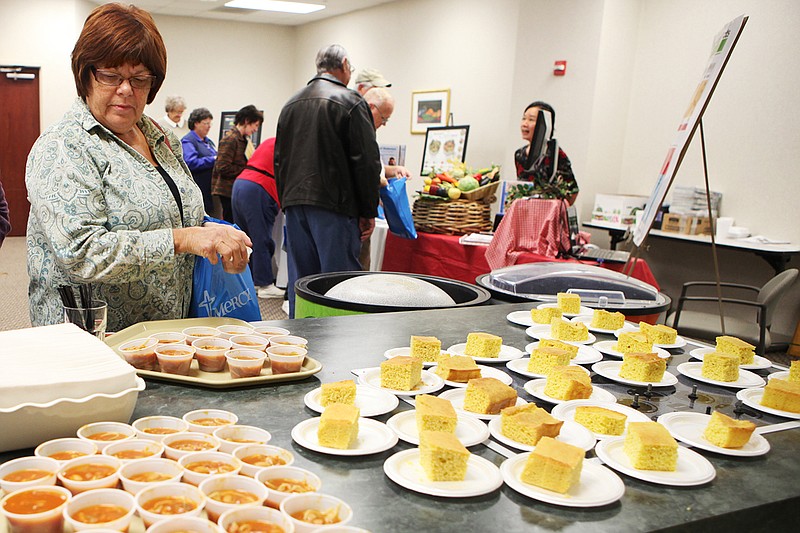HOT SPRINGS — Jim Murphy has diabetes, but he told a group of fellow diabetics on Tuesday that no one should be ashamed of having the disease. Instead, they should have the courage to control it by making changes in their lives.
“I don’t hide my diabetes,” he told more than 100 people gathered for a Diabetes Fair at Mercy Hospital in Hot Springs. “I think that has helped me feel normal about having it. I think it’s also why I like spreading some good information.”
A member of the A1C Champions, an educational program in which diabetics speak from personal knowledge and experience about the challenges and obstacles — physical, mental and social — in maintaining control of their blood-sugar levels, Murphy is chair of an organization in St. Louis made up of insulin-dependent, or Type 1, diabetics.
Dressed in a bicycling-team shirt and filled with energy, Murphy tested his own blood sugar while addressing the audience at the hospital. He said taking a reading of his blood-sugar count is too important to feel any embarrassment about taking out a tester and drawing blood.
He said maintaining good blood-glucose control comes from overcoming fears about having diabetes, understanding effective self-management and developing a balanced, healthy lifestyle.
“It is all about balance,” said Doreen Harris, a nurse at Mercy who works with the hospital’s diabetes education program and the wound center. “If a person can make changes in their lifestyles, they will have success.”
Harris said one out of 14 Americans, or about 26 million people in the U.S., have diabetes. She said 85 percent of those have Type 2 diabetes, which means their bodies are still producing insulin and that they should be able to control their blood-sugar levels. In addition, there are an estimated 7 million additional Americans who are undiagnosed.
“Some people with Type 2 who do not go to their doctors regularly may not even know they have diabetes,” Harris said. “Sometimes the symptoms have been passed off as other things, or they are in denial. People need to notice the warning signs.”
The signs of diabetes include the following:
• Unusual thirst;
• Extreme hunger;
• Unusual weight loss;
• Fatigue and irritability;
• Blurred vision;
• Being slow to heal;
• Tingling or numbness in hands or feet; and
• Recurring skin, gum or bladder infections.
Mercy Diabetes Fair organizers said the event was held for those who have been diagnosed with either type of the chronic condition. Along with Murphy’s address to the group, the audience met with hospital nutritionists and licensed dietitians, who explained the need for individual meal planning, and a class was held on the importance of remaining active with exercise and daily movement. In another room, vendors displayed aids in glucose control, from blood-sugar testers to fitness centers.
November is American Diabetes Awareness Month, and Saline Memorial Hospital in Benton also held a Diabetes Fair on Nov. 8, for Saline County. The four-hour event also offered vendor information and included free screenings for blood-sugar levels, foot exams, blood-pressure checks and calculation of body-mass index, which indicates the amount of fat in a person’s body. Blood tests for cholesterol levels were also available for a small fee. Educational classes about preventing and living with diabetes were also available.
Staff writer Wayne Bryan can be reached at (501) 244-4460 or wbryan@arkansasonline.com.
